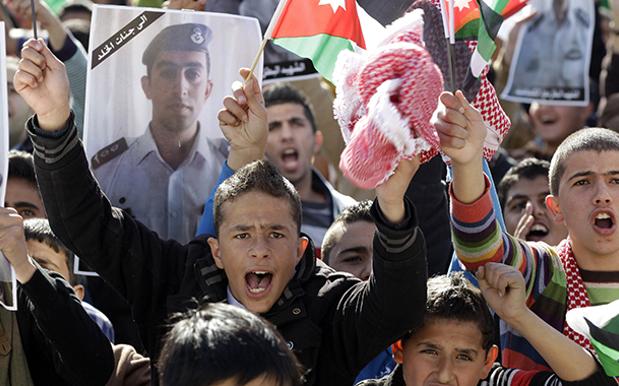
If you’ve been anywhere near a newspaper over the past few days, you’ve probably noticed a significant amount of prominent coverage concerning the escalating situation between Jordan and the Islamic State.
But for those of you who might have skipped the initial stages of this rapidly developing, and extremely complex issue, catching up on it might prove to be something of a mountain, given the wide and extensive attention the media has been giving it.
We’ve spent a good amount of time wading through the issue and its root causes in the hopes that this distillation of the issue will provide you with some enlightenment on the subject, and – at the very least – bring you up to speed on what’s turning out to be an extraordinarily tense and concerning situation.
Right, straight off the bat, where is all this taking place?
Yeah, let’s get the geography out of the way first. Jordan is a small, Arab kingdom in the Middle East with a population of roughly 6.4million people. Its land borders operate as something of a geographical buffer, sharing borders with Israel, Lebanon, Saudi Arabia, Syria and Iraq.
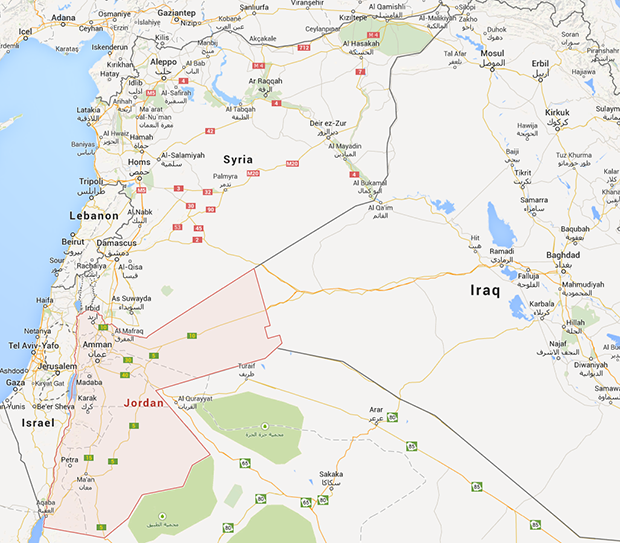
On the other side of the coin, the Islamic State – referred to in the media at times as either ISIS or ISIL – controls a surprisingly expansive area of territory across both Syria and Iraq, with the Iraqi borders of their controlled territory reaching almost to the Jordanian borders.
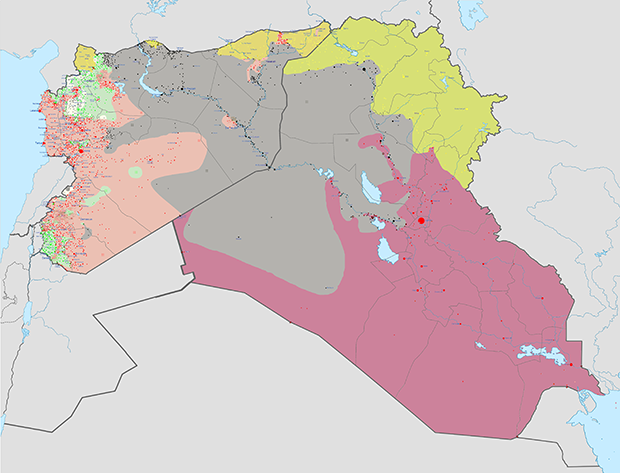
The area in dark grey represents IS’s territory. They operate out of the de facto capital of Al-Raqqah in Syria.
Why has all of this exploded all of a sudden then?
Jordan is a strong ally of the United States, particularly in military involvement, and so their participation in the US-coalition backed offensive operations against the Islamic State has always been present. But tensions between IS and Jordan have really hit fever pitch over the course of the last week due to the execution of Muath al-Kasasbeh – a captured Jordanian Air Force pilot.
What happened there?
al-Kasasbeh was captured by Islamic State forces after his F-16 went down during a bombing run in December. Jordan and the Islamic State were engaging in prisoner exchange talks that would have seen al-Kasasbeh released back to Jordan in exchange for Islamic State prisoners being held in Jordan. When Jordan demanded proof-of-life (i.e. some evidence that al-Kasasbeh was actually still alive) the talks completely broke down and IS quickly released a very well-produced video purportedly showing al-Kasabsbeh’s graphic execution.
Oh god, that’s awful. What was in the video?
The 22 minute long video appears to show a very badly beaten al-Kasasbeh sitting at a table discussing coalition-led operations inside Iraq and Syria, with the flags of participating nations projected behind him. It then cuts to what appears to be al-Kasasbeh wearing an orange jumpsuit and standing inside a metal cage. An IS militant then lights a trail of propellant that leads towards the cage. al-Kasasbeh was burned alive.
FUCK. WHAT? That’s barbaric.
Yeah. Jordanian State TV confirmed that al-Kasasbeh was in the video, and that he was indeed murdered at the hands of Islamic State. Though the video wasn’t immediately independently verifiable.
Jesus. What does all that mean?
It means that, despite offering to spare al-Kasasbeh and engage in a prisoner exchange deal with Jordan, it’s entirely likely that he was dead the entire time, and that the Islamic State carried out the execution well before engaging in talks with Jordan. Experts estimate the killing could have taken place as early as the 3rd of January.
They were going to pull the wool over Jordan by offering to spare a guy they’d already killed? That’s horrendous.
Sure is.
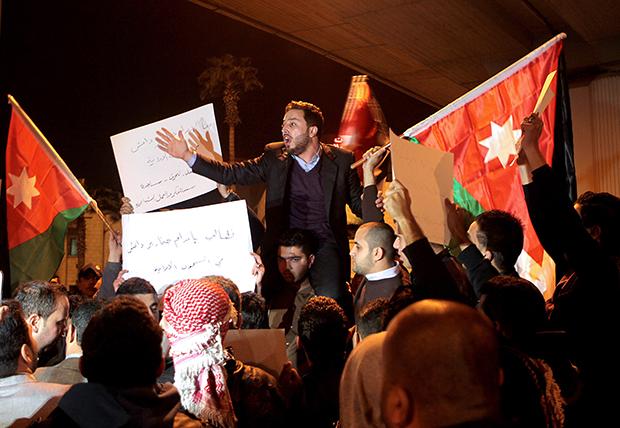
How has Jordan reacted?
The public grief for the fallen pilot has been an outpour, with people taking to the streets to show their solidarity for the man’s family and friends, and to vent their outrage at the actions of the Islamic State. al-Kasasbeh was a member of the large Jordanian tribe that forms the backbone of support for the country’s Hashemite monarchy, so the attention the issue has been getting with Jordan has been very high for a number of weeks.
As far as the official response, Jordan’s ruling leaders are extremely pissed off, and have reacted swiftly. The revelation of al-Kasasbeh prompted the immediate retaliatory execution of two Iraqi militants – both of whom were the subject of the failed prisoner exchange negotiations.
Oh man. Who did they execute?
One was Sajida al-Rishawi, who was convicted and sentenced to death for her role in a 2005 suicide bomb attack that killed 60 people. The other was Ziyad Karboli, an Al Qaeda operative, who was convicted in 2008 for murdering a Jordanian man. Both were hanged at dawn the morning after the video was released.
Ugh. This is a mess already.
Completely. Further to that, Jordan’s King Abdullah II has gone on the offensive, stating very firmly that Jordan’s efforts against the Islamic State will only increase, and their response to the death of al-Kasasbeh will be “severe.” More to that, Jordan’s Information Minister Mohammed Momani stated the response will be “earth-shattering.”
Yikes. Those are some strong words from officials. What else have they done so far?
Jordan has increased their bombing runs from their Air Force, with reports claiming that they’ve killed as many as 55 Islamic State militants in ensuing raids.
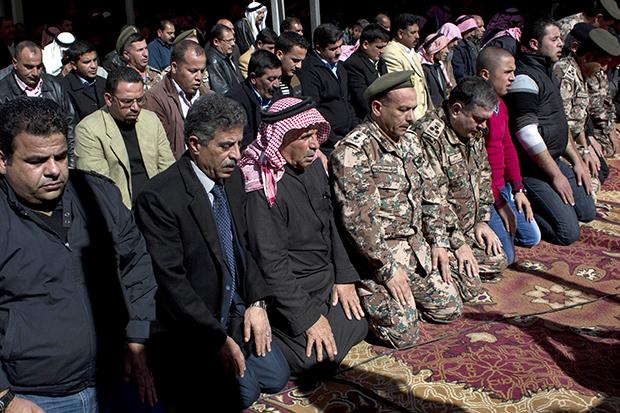
So their plan is just to bomb them into the ground? That should work, right?
Not really, no. Jordan’s not a huge country by any stretch of the imagination, and their stocks of essential supplies required for bombing raids tends to run a bit thin. Things like missiles and fuel tend to run in short supply, so the country has been attempting to strengthen their relationship with the US in order to acquire more supplies. In fact, when word spread of the pilot’s execution, King Abdullah II was actually in the United States negotiating for exactly that. The US and President Barack Obama have come into bat for Jordan, with foreign aid to the nation being increased to US$1billion.
Additionally, Islamic State forces have been getting smart about how they position themselves to deal with air raids. More and more they have been stationing their forces in densely packed civilian areas, eliminating obvious and open “targets” for bombing runs to attack.
Tell me more about this King Abdullah II.
Gladly. He’s an interesting fellow to say the least. A former Air Force pilot himself, with an alleged penchant for flying helicopters, His Royal Highness has taken an unusually visible and direct approach to dealing with this issue. The death of the young pilot seems to have hit him particularly hard, with the King having referred to the fallen young man as something of a spiritual son – he even personally visited al-Kasasbeh’s own father and talked with him at length. In fact, such is the strength of the military blood that runs through his veins, that the official Facebook page of the The Royal Hashemite’s Court posted this photo of the King just a couple of days ago.
This has led some to speculate that the King himself might have been personally piloting planes on bombing runs through Syria.
That’s… odd.
Right? It gets better though. In declaring intentions to exact revenge upon the Islamic State, King Abdullah II allegedly directly quoted the Clint Eastwood film Unforgiven. Whilst in the US to address Congress, a number of reports surfaced that, whilst in a closed-door meeting with US Governmental officials, King Abdullah expressed his extreme anger and thirst for vengeance, drawing comparison to the film, and allegedly pulling a direct quote from the film’s dialogue.
It’s a little unclear as to what line exactly he used, but the suggestion from the media seems to be that it’s likely he pulled this cracker out of the bag:
“Any man I see out there, I’m gonna kill him. Any son of a bitch takes a shot at me, I’m not only going to kill him, I’m going to kill his wife and all his friends and burn his damn house down.”
Hooley fkn dooley!
Seriously.
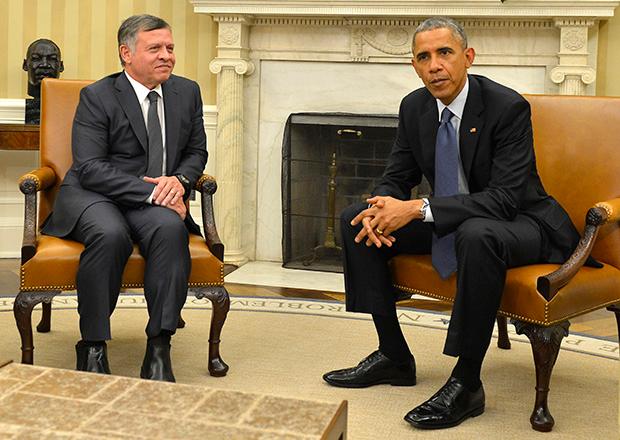
Alright, so what’s the plan now?
Jordan – and the greater US-led coalition – are unlikely to be able to get the job they want done solely through the air. So one of the few effective alternatives is to launch a ground offensive and physically send troops into Syria to try and wrestle control of Islamic State strongholds back. Jordanian legislators have refused to rule that out, and the stage now appears set for a ground invasion to take place utilising Jordan’s front-line infantry, and their remarkably adept special forces units as well.
However, even despite all their rage, they’re still currently bound by the United States’ set rules of engagement, which – at least outwardly – call for the minimisation of civilian casualties. And with the Islamic State holing up in populated areas, that could still prove to be a reasonably tricky task.
The European Union is already prickly at Jordan’s now shown propensity to exact eye-for-an-eye style revenge, and whilst they’ve shown solidarity towards the cause, they’ve also expressed concern over doing things rashly.
The long and short of it is that it’s an unfathomably terrible situation that appears poised to get much, much worse before any hope of it getting better is seen.
If you feel like doing a bit more reading on the subject, the ABC has an excellent series of interactive articles.
Photos: Khalil Mazraawi, AFP, Pool via Getty Images.



